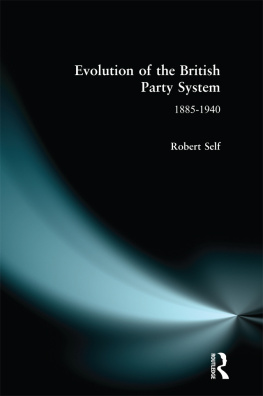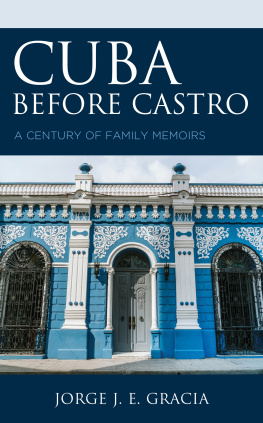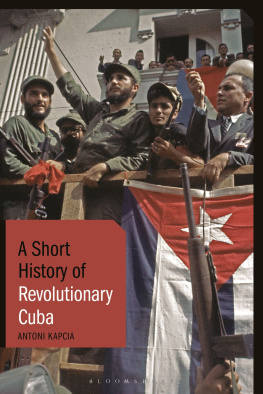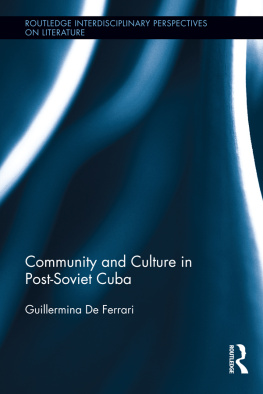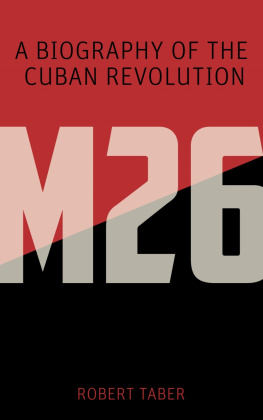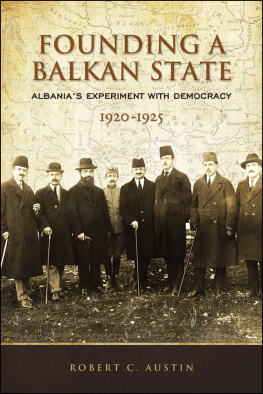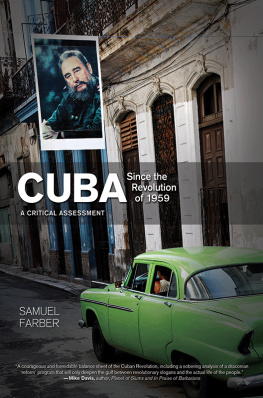2001 The University of North Carolina Press
All rights reserved
Set in Cycles and Arepo typefaces by Tseng Information Systems, Inc. Manufactured in the United States of America
The paper in this book meets the guidelines for permanence and durability of the Committee on Production Guidelines for Book Longevity of the Council on Library Resources.
Library of Congress CataloginginPublication Data
Whitney, Robert (Robert W.)
State and revolution in Cuba: mass mobilization and political change, 19201940 / Robert Whitney.
p. cm.(Envisioning Cuba)
Includes bibliographical references and index.
ISBN 0807826111 (cloth: alk. paper)
ISBN 0807849251 (pbk.: alk. paper)
1. CubaPolitics and government 19091933.
2. CubaPolitics and government 19331959.
3. Government, Resistance to CubaHistory20th century.
4. OligarchyCubaHistory20th century.
5. Political participationCubaHistory20th century.
6. DemocracyCubaHistory20th century.
I. Title. II. Series.
F1787 .W58 2001
972.9106 dc21
00051205
05 04 03 02 01 5 4 3 2 1
Acknowledgments
I am grateful to Catherine LeGrand for her help and encouragement throughout the writing of this book. She is an exemplary scholar and teacher and a wonderful person. Her insightful and constructive criticisms helped me sharpen my arguments and correct my habit of tripping over my own words.
In Cuba I owe a special kind of recognition to Dr. Jos Tabares del Real of the University of Havana. The endnotes and the bibliography of this book attest to his scholarly contribution to the study of Cuban history. What these references cannot communicate is how honored I am to have felt his generosity and personal warmth. Not only did he facilitate my access to archives, arrange interviews with historians and other knowledgable people, and provide me with documentation hitherto unavailable to academics, but he also introduced a foreigner into the murky history of Cuban revolutionary politics. Pepe Tabares could do this because his credentials as a writer of history are matched only by his reputation as someone who helped change history. By sharing this aspect of his life with me, he has given me something that no pure academic can give, and for that I am deeply grateful.
I would like to thank the Cuban Institute of History for sponsoring my research trips to Cuba between 1990 and 1994. In particular, the institute's late president, Jorge Mendoza, gave me full access to institute archives. His successor, Manuel Lpez, has shown the same kindness in recent years. My research at the institute would not have been possible if it were not for Sergia Martnez, formally of the institute's International Relations Department. Sergia did all the work no one sees and few appreciate: she arranged visas, wrote letters of introduction, confirmed airplane tickets, fought with bureaucrats, and arranged transportation to and from archives. These tasks, of course, were part of her normal job, but much of my research was carried out at a time when life in Cuba was far from normal. My academic visits to Cuba coincided with the worst years of the Special Period (1990-94): power failures were common, transportation was nearly nonexistent, food was in short supply, water often stopped running, and the telephones rarely worked. Somehow, Sergia managed to get everything done with her usual professionalism and with a warm smile. I do not how she did it all, and she tells me she does not know, either. I cannot imagine having written this book without her.
Similar professionalism and personal warmth was exhibited by the librarians and archivists of the Instituto de Historia, the Cuban National Archives, and by the staff of the Biblioteca Nacional Jos Mart. Their country was a mess and their personal lives and routines in turmoil, yet they always provided me with more information than I asked for, most of which appears in the sources for this book.
Several Cuban scholars helped me clarify my ideas, and they generously gave of their time, experience, and hospitality. Jorge Ibarra, Oscar Zanetti, Alejandro Garca, Pedro Pablo Rodrguez, Ana Cairo Ballester, Graciella Chailloux Laffita, Carlos del Toro, Jos Cantn Navarro, Rosa Lpez Oceguera, Rafael Hernndez, Newton Briones Montoto, Rafael Soler, and the late Ramn de Armas have set a very high standard for historians of Cuba, and I am very grateful for their advice, friendship, and support. All of these people generously shared private research sources with me and they let me read many of their unpublished works. I am proud to be permanently in their debt. I would also like to thank Enrique de la Osa and Segundo Curti for sharing their personal experiences of the events covered in this book. Both men were important participants in Cuban political life between the 1920s and the 1940s, and their insights into the times brought life to the primary sources I was reading. Both men passed away during the final stages of writing this work. I will always remember their kindness, eloquence, and dignity.
John Kirk from Dalhousie University and Barry Carr of La Trobe University were kind enough to read and comment on earlier drafts of this book. Both scholars know Cuba and Cuban history well, and I am grateful for their support and encouragement. In the late stages of writing this book the sound advice and guidance of Louis Prez Jr. and Harold Sims was decisive. Both the content and the form of this book has been made stronger and more coherent thanks to these four eminent scholars.
Two people who have influenced me greatly over the years are David Johnson and Fred Judson, both of the University of Alberta. I can only hope that this book has come close to what they would expect. At Queen's University David Eltis, David Parker, and Robert Malcolmson made constructive criticisms which tightened the central arguments of the book. Sam Noumoff of McGill's political science department shared his considerable knowledge of the history of the communist movement in general and the Comintern in particular. I would also like to thank Claude Morin and Karen Robert for their constructive criticisms.
Important segments of the research for this book would not have been possible if it were not for the generosity of Susan Fernndez at the University of South Florida. She welcomed a stranger into her home and introduced me to the wonderful Cuban collections in Tampa and Gainesville. It is also thanks to her that I met Robert and Delia Lauriault, who in turn pointed me in the direction of Carl Van Ness of the University of Florida's archives. Without Carl's incredible knowledge of the Braga Brothers Collection this book could not have been written. I am deeply appreciative of their kindness and for the pleasant evenings I spent in the company of Susan, Robert, and Delia.
I am very grateful to Elaine Maisner of the University of North Carolina Press for her effort and encouragement. Her guidance and interest in Cuba made the final stages of writing and editing a pleasure. At an early stage of editing, Viki Marcok and Gaspar Quintana Alberni were more helpful than they give themselves credit for.
On a more personal note I would like to express my gratitude to Cuban friends who opened their doors to me while I worked in Cuba. Year and after year Clara Alberni, Gaspar Quintana, and Maricel Bauz gave me a home away from home. Hard times can forge strong friendships, and the constant blackouts, water shortages, the lack of food, and the general malaise and chaos of living in Cuba during the 1990s have created personal bonds that words cannot describe. They, like the vast majority of Cubans, survived (as they do today) on their wits, inventiveness, creativity and good humor. Not only did I benefit from their capacity to resolve the endless problems of day-to-day existence, but I feel part of a family, which is truly an honor. In the same spirit I must mention the friendship of Marit Lpez Tamargo. Marit, along with her father, mother, and brother, gave me a place to go when I was tired of talking about history and politics (though, of course, we still


